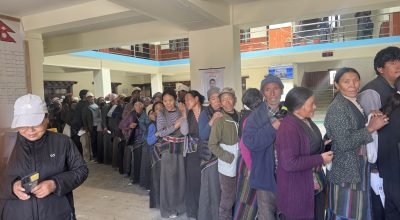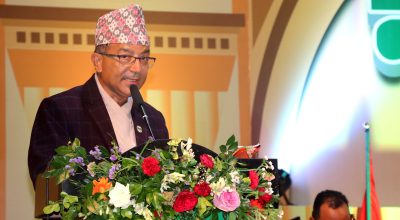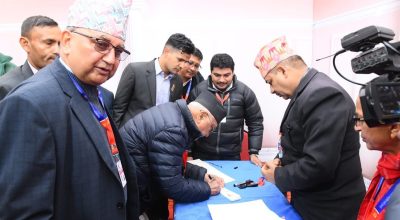
Bhisma Raj Ojha/RSS
KATHMANDU: Nepal is preparing to raise the issue about impact of climate change on mountain region with much priority during the 26th UN Climate Change Conference of the Parties (COP26).
Study shows that Nepal’s highland has witnessed the temperature rise by 1.8 degree Celsius when global warming is measured at 1 degree Celsius.
The impact of climate change on the entire mountainous economy and on ecosystem there, and in the low-laying areas will be relatively the issue of priority of Nepal during the Conference scheduled to be held in Glasgow of the UK from November 1 to 12 this year.
It may be noted that Nepal is identified as vulnerable to climate change impact due to its sensitive geography.
Climate change-related hazards and losses, search for resources for the implementation of the National Contribution Commitment (NDC) report, and carbon finance are other agenda that Nepal set with priority for the Summit, according to the Ministry of Forests and Environment.
The Ministry is currently seeking submission about the subjects from experts multi-sectoral and multi-concerned bodies from government and nongovernment sectors. It has organised discussions with several 10 groups to collect submissions for its preparation before taking part in the Summit.
According to Ministry’s secretary Dr Pem Narayan Kandel, the Status Paper for the Conference will be prepared after organising a national- level dialogue being based on the report to be prepared after multi-sectoral dialogues.
Nepal has already presented the NDC along with other several countries for the implementation of the Roadmap for Global Climate Action that aims to bring down the greenhouse gas emissions to nil by 2050.
The Paris Agreement, the document that serves as a legally binding international treaty on climate change, has set a goal to limit global warming to well below 2 degree Celsius, preferably to 1.5 degrees Celsius, compared to pre-industrial levels. The document also known as the Paris Accord was adopted by 196 Parties at COP 21 in Paris, on 12 December 2015 and entered into force on 4 November 2016.
The Ministry has submitted a report with strategic plan, saying Nepal is committed as per the roadmap.
The report has mentioned about what kind of assistance is needed at national and international level for Nepal in course of NDC implementation.
Secretary Kandel said, “Nepal needs 25 billion US dollar to implement NDC. This is also carbon reduction plan.”
The Ministry has been preparing strategic report regarding Nepal’s sensitivity and risk from climate change.
As per the climate related loss and damage report, 627 people lost their lives every year from 1971-2019 from climate related incidents.
According to the data of the Ministry, the average annual loss of physical property is around three billion rupees. Property worth seven million rupees was damaged in 2017 and there is a huge damages of physical property this year too.
High-level delegation to participate
The Ministry has been making preparation to participate in the conference by a high-level delegation under leadership of Prime Minister Sher Bahadur Deuba.
It is said that Prime Minister Deuba would participate in Global Leader Summit to be organised by Prime Minister of the United Kingdom, Boris Johnson, from November 1-2.

Heads of the state and government of the world would participate in the summit. Saying the Prime Minister would address the Summit and the Ministry has been doing homework regarding the issues to be raised by Nepal, Secretary Kandel added that they are excited due to high-level participation from Nepal.
He shared, “We have believed that there will be more strong presence of Nepal in the conference due to effective preparations and high-level participation.”
Kandel opined that, “Apart from this, though Nepal has small role in green gas emission, it is on the list of the countries mostly affected from the impacts of climate change. Nepal has always been raising this issue with priority in international forum.”
Climate Change Management Division Chief Dr Radha Wagle shared that the COP26 will be crucial for discussing new and very influential incidents related to climate change occurred in countries across the world including Nepal.
The annual event could not be held last year. Dr Wagle believed that this year’s event would be important to deliberate on the issues raised by the latest report of the Inter-Governmental Panel on Climate Change (IPCC).
For the mountainous country like Nepal, issues relating to mountainous areas are as important as the issues relating to the ocean basin as COP26 is going to call upon the signatory parties to agree upon the preservation and restoration of the ocean’s blue carbon assets.
The IPCC report brought the facts to fore that the glaciers were melting and receding and the snow cover was depleting. Limiting the global warming to 1.5 degree Celsius above pre-industrial levels would be a herculean task, involving rapid, dramatic changes in how governments, industries and societies function, the IPCC stated in its report.
The chain effects of climate change have been experienced by various countries including Nepal. Unprecedented level and erratic patterns of rainfall during the monsoon, monsoon-induced disasters incurring a huge loss of lives and properties in the country are rife.
Dr Wagle viewed, “The climate change related losses are occurring in high intensity lately. Since we need financial resources to address the climate change, the event would provide an opportunity to arrange for funds and deliberate on how to reduce climate change related risks and how to compensate to the damages and the victims.”
The Ministry was also preparing for the sideline events to be organized during the COP26. According to Dr Wagle, Nepal’s national plans to be presented in the event were in the final phase.
Since she helmed the Division, documents such as Technological Need Assessment (TNA), Third National Communication (TNC), strategy for gender and social inclusion among others were prepared and presented to the concerned authority, she said.
A Steering Committee was formed comprising secretary Kandel as the advisor, Dr Wagle as coordinator, Under-secretary Raju Sapkota, Srijana Shrestha and Milan Dhungana as members and Under-secretary Arun Prakash Bhatta as member-secretary to prepare for the conference.
The Committee members had participated in events related to the preparation of the COP26 since December last year.











